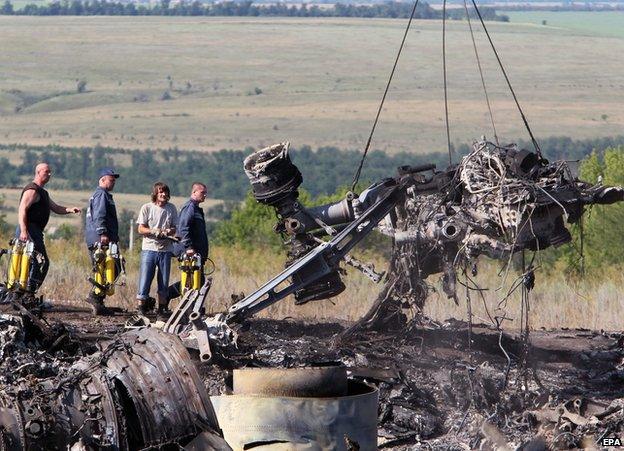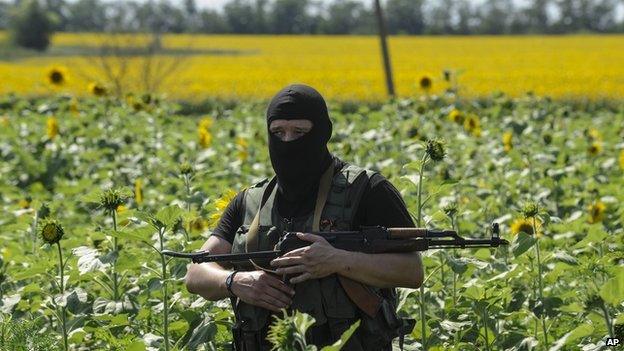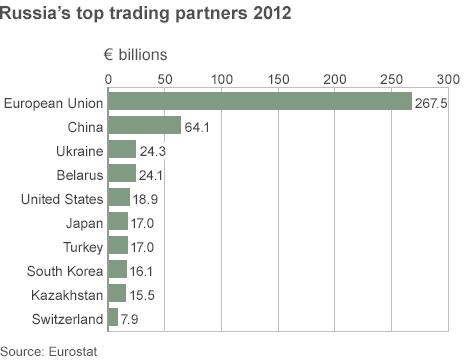MH17 plane crash: EU moment of decision
- Published
- comments

The airliner disaster in Ukraine has fuelled Western fury over Russian support for the rebels
For months the EU has displayed extreme reluctance over tightening sanctions, external against Russia over Ukraine. It has preferred to take small steps - travel bans and asset freezes against individuals - rather than to go after the "inner circle"' around President Vladimir Putin.
And Europe's leaders have repeatedly shied away from what they call Level Three sanctions - going after sectors in the Russian economy.
The reality is that, so far, the EU has struggled to find unity over how to respond to Russia. Sanctions require unanimity and they have had to settle for the lowest common denominator.
Germany and Italy - to take just two countries - have been wary of unsettling relations with Moscow. Italy with its fragile economy, which continues to hover close to recession, is very dependent on Russian energy.
Germany has 6,000 firms which do business in Russia. Some of its leading industrialists have been vocal in opposing sanctions.
France has resisted pressure to halt delivery of two Mistral helicopter carriers to Russia. Only last month 400 Russian sailors arrived at the French port of Saint-Nazaire for training.

The pro-Russian rebels are under suspicion over their handling of plane debris scattered over a wide area
Taking an economic hit
Here is the dilemma: The EU understands that Russia's vulnerability is its economy, which is on the brink of recession. The UK Defence Secretary Philip Hammond said "we can inflict damage on the Russian economy". But the eurozone economy, too, is weak.
Industrial output in Germany has dropped for three successive months. (Some Germans economists are arguing there is already a Ukraine effect depressing the German economy.) France is stagnant. And yet senior officials all recognise that unless EU countries are willing to absorb a certain amount of economic damage their message to President Putin lacks conviction.
Now in the aftermath of the shooting down of Malaysia Airlines flight MH-17 the issue becomes more acute. David Cameron has said "some in the West, instead of finding the resolve to deal with this issue, have simply hoped it would go away".
David Cameron, Francois Hollande and Angela Merkel have spoken on the phone and according to Downing Street have "agreed that the EU must reconsider its approach to Russia and that foreign ministers should be ready to impose further sanctions on Russia when they meet on Tuesday".
The UK is arguing for sanctions to be extended to President Putin's inner circle - the so-called Putin cronies. Some other countries are inclined just to add further names to the 70 individuals already facing asset freezes and a travel ban.
Others want a financial embargo, progressively making it more difficult for Russian companies to access lines of credit, or a ban on the export of defence equipment to Russia.

Certainly the Americans have been frustrated at what they regard as Europe's "tepid" moves against Moscow.
Only last week, while the EU was ordering its European investment and development banks to suspend financial arrangements with Russia, external, the United States was targeting two major energy firms, arms companies and important financial institutions.
The EU does far more trade with Russia than the US does - so Europe has more at stake economically as ties with Russia deteriorate.
How to handle Putin?
But the American moves obviously hurt. President Putin said that the sanctions were driving the Russian-American relationship "into a dead end". David Cameron believes that President Putin ''needs to feel some pain before he will change his behaviour".
It has long been Angela Merkel's view that it is important to keep talking to President Putin. She firmly believes in dialogue and has spoken to the Russian president more than any other leader. She is said to have become disillusioned by assurances given and then broken but she - and in particular her coalition partners - does not want to return to a new freeze between East and West.
That is why it is likely that any further sanctions are likely to be gradual. Behind the scenes there are powerful voices warning of the danger of backing President Putin into a corner.
Today he appeared on Russian television to announce that Russia would do all it could to end the Ukraine conflict. So Europe's foreign ministers will have difficult judgements to make. For their own credibility they will have to take further steps against Moscow, but they will want to leave open the door to compromise and dialogue.
